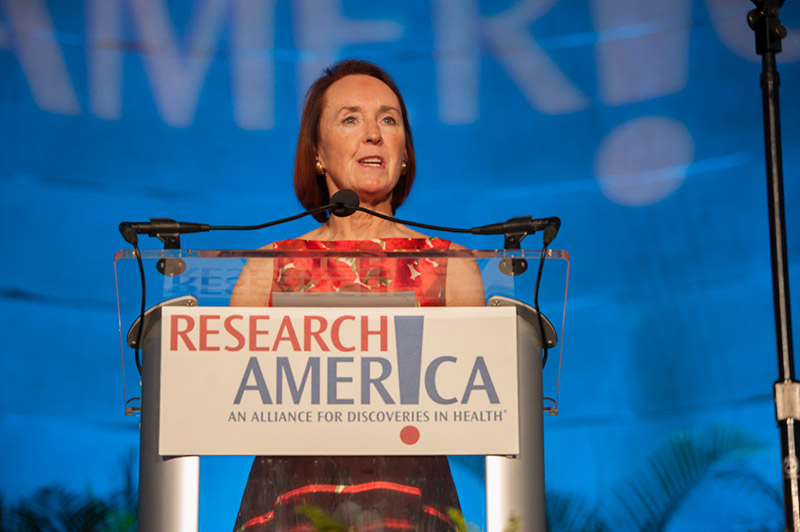Stepping Up Investments in Science


Dear Research Advocate,
The White House sent its annual memo on research and development priorities to federal agencies this week. The memo, co-authored this year by OMB Acting Director Shalanda Young and OSTP Director Eric Lander, provides guidance to agency leaders as they prepare FY23 budget requests. In it, the authors highlight the unprecedented challenges and opportunities we face, showing the continued emphasis by the Biden Administration on building U.S. S&T capacity, including via greater cross-agency collaboration. These priorities resonate strongly with the goals of the S&T Action Plan. (Endorsements of the Action Plan are still open.)
Strengthening U.S. S&T capacity will be the focus of a dialogue with NSF Director Sethuraman Panchanathan and other research leaders during our National Health Research Forum (#RAForum). Key themes to be discussed (with your real time input!): the potential benefits of dramatically stepping up our nation’s S&T investments and the risks if we don’t; why the social sciences are needed to leverage S&T innovation; and the growing power of interdisciplinary science.
A new, nonpartisan 501c4 organization called Start with NSF has been formed to help advocate for NSF, pulling in new allies from industry, venture capital, and small business. It’s another indication of heightened interest in bolstering our nation’s S&T capacity. Organization leaders are invited to sign on to a letter calling for robust NSF funding (I have signed on for Research!America); the deadline to sign on is September 10.
On the Hill: Both chambers of Congress are in recess, but Democratic committee staff are working to craft the $3.5 trillion reconciliation bill ahead of a leadership-imposed September 15 deadline. Preliminary numbers suggest robust dollars for science and technology agencies — a welcome development that also closely mirrors the S&T Action Plan goals.
The House Energy & Commerce and Senate Finance Committees are working on reconciliation provisions to allow the federal government to negotiate Medicare drug prices. Such proposals may go farther, imposing an excise tax on companies that do not extend Medicare prices to all payers…in other words, a form of price controls. Before these proposals are in print it is difficult to evaluate them. However, it will be important for the committees to share their analyses of the impact of these changes on our nation’s R&D ecosystem and the medical progress that arises from it.
There is no doubt that health care affordability is crucial, as are fast-paced progress, equitable access, and high quality care. We hope you’ll join a discussion led by former CMS and FDA leader, and Research!America Board Member, Mark McClellan, during the National Health Research Forum (#RAForum) about these interconnected imperatives.
Calling Early Career Scientists! We are pleased to announce the fourth year of our Civic Engagement Microgrants program, designed to support graduate student and postdoc groups across the sciences to create opportunities for engagement with local community leaders, government officials, and the public. The program is generously supported by the Rita Allen Foundation. Please share this terrific opportunity with your colleagues, students, and others. Learn more and apply; applications are due by October 4.
Early career scientists were invited to “re-imagine the next 75 years in science policy” in a special issue of the Journal of Science Policy & Governance (JSPG) with support from the Kavli Foundation and AAAS. You can read their thoughtful and compelling pieces here.
Cancer Awareness: September is awareness month for several types of cancer: childhood, leukemia and lymphoma, ovarian, prostate, thyroid, and uterine cancers. We will highlight cancer during the Forum on the morning of September 15 with two sessions addressing cancer research, innovation, and clinical trial diversity. We encourage you to use and share our fact sheet on cancer (updated in partnership with the Lasker Foundation).
One More Forum Highlight: I know I’m inundating you with Forum information but that’s because it’s just around the corner and we are so excited about our incredible lineup of thought leaders! The afternoon of Wednesday, September 15, we’ll be joined by Peter Marks, MD, Director of the Center for Biologics Evaluation and Research (CBER) at FDA. CBER has been integral in evaluating and monitoring the safety and efficacy of COVID-19 vaccines. See still more highlights and register now for the Forum.
Alliance Meeting Recap: Today, we heard from Carrie D. Wolinetz, PhD, Deputy Director for Health & Life Sciences in the Office of Science & Technology Policy, on OSTP’s priorities, including fostering equity in health science, the promise of ARPA-H, and how the Office is preparing for future public health threats. Watch the recording.
Upcoming Alliance Meetings:
- On Thursday, September 9, at 11 a.m., join us to hear from Rima F. Khabbaz, MD, Director of the National Center for Emerging and Zoonotic Infectious Diseases at CDC. NCEZID is playing a pivotal role in pandemic response and preparedness; the conversation promises to be a timely one.
- On Monday, September 20, at 1 p.m., join us for a conversation with Aisling McDonough and Emma B. Alme, PhD, from the office of House Energy & Commerce Health Subcommittee Chair Anna G. Eshoo. Aisling and Emma, who are supporting the Chairwoman’s leadership role on ARPA-H, will provide an update on ARPA-H legislation and field audience questions.
Stay well, stay safe, and stay connected.
Sincerely,
Mary Woolley




